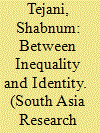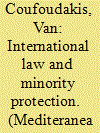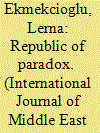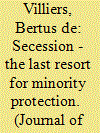| Srl | Item |
| 1 |
ID:
124973


|
|
|
|
|
| Publication |
2013.
|
| Summary/Abstract |
Recent attention to the history of constitution-making in India reflects ongoing concerns about the difficulties and limitations of India's secular, democratic experiment. Scholars assessing India's secularism have pointed to the failure to separate the state from its involvement in religion from the outset. Through a study of the Constituent Assembly debates, this article suggests that the emphasis on 'religion' as the problem for secularism has been a distraction, taking the gaze away from the substantive arguments minorities were making about how their equal citizenship should be guaranteed. It remained unclear what recognition of 'minority' status was meant to achieve in postcolonial India and what it signified. In failing to recognise the claims of religious minorities for their equality, the Constituent Assembly reified their position as permanently unequal communities in the newly independent state.
|
|
|
|
|
|
|
|
|
|
|
|
|
|
|
|
| 2 |
ID:
085299


|
|
|
|
|
| Publication |
2008.
|
| Summary/Abstract |
In this essay a largely forgotten human rights issue involving the fate of the Greek-in-origin population that inhabited the Turkish islands of Imbros and Tenedos is examined. Exempted from the Greek-Turkish population-exchange agreements concluded following the end of World War I, the Greek population of the two islands was granted specific civic, cultural, and religious rights by the 1923 Treaty of Lausanne. The treaty remains valid to this day. Turkey deliberately violated the rights of this population because of its ethnicity, religion, and language. The author analyzes the methods used by Turkey to ethnically cleanse the two islands and the options available to the former residents of these islands as well as to the governments of Greece and Turkey to resolve the documented violations of the Treaty of Lausanne and of the European Convention on Human Rights.
|
|
|
|
|
|
|
|
|
|
|
|
|
|
|
|
| 3 |
ID:
134628


|
|
|
|
|
| Summary/Abstract |
This article focuses on the years after World War I, especially the first decade following the 1923 establishment of the Republic of Turkey, in order to analyze the position of minorities in the developing “we” of the new nation as projected by its political elite. Situating the discussion in the context of the League of Nations interwar minority protection regime, I demonstrate that the Treaty of Lausanne, which the Ankara government and the Allies signed in July 1923, played an important role in the conflicting treatment that minorities have since received in Turkey. The treaty's minority protection clauses entrenched divisions that had already been formed in the Ottoman Empire during the violence of the preceding decade, including the Armenian genocide. Moreover, reminding Turkish leaders of how 19th-century European imperial powers had used the cause of Ottoman Christians’ suffering as an excuse to infringe on Ottoman sovereignty, these clauses alarmed the Turkish political elite, especially as the “Great Powers” themselves were not bound by such minority protection guarantees. The goal of preventing a repetition of this unbalanced international power dynamic, which, according to the new Turkey's leaders, had led to the demise of the Ottoman Empire, engendered paradoxical policies toward non-Muslim Turkish citizens; they have been largely excluded from a Turkness (Türklük) to which they were sometimes included, even forcibly included.
|
|
|
|
|
|
|
|
|
|
|
|
|
|
|
|
| 4 |
ID:
121831


|
|
|
|
|
| Publication |
2013.
|
| Summary/Abstract |
'Secession' is a word that brings fear to nations. It reeks of conflict, violence and instability. It is also a measure of last resort. It sometimes brings hope to minorities that are in despair and who feel permanently excluded from policy making. This article looks at some of the faces of secession. It investigates how international law is vague on the one hand and pragmatic on the other hand when it comes to secession. It shows how, in recent times, secession has been endorsed by the international community in cases such as East Timor, Eritrea and Kosovo while in Ethiopia and Canada legal mechanisms exist for managing demands for secession. Consideration is given to some of the pre-requisites for secession. Finally general observations are made about secession as a mechanism to protect minorities.
|
|
|
|
|
|
|
|
|
|
|
|
|
|
|
|